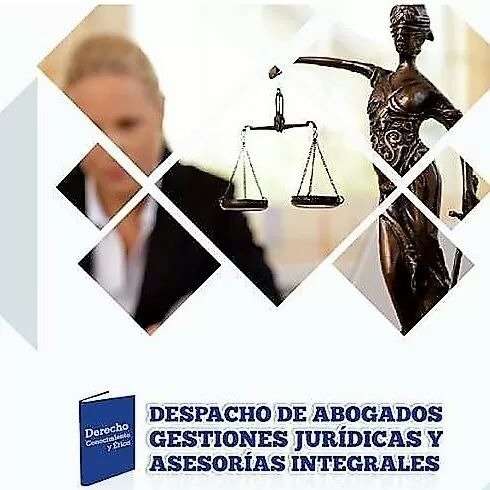Best Financial Services Regulation Lawyers in Colombia
Share your needs with us, get contacted by law firms.
Free. Takes 2 min.
Or refine your search by selecting a city:
List of the best lawyers in Colombia
About Financial Services Regulation Law in Colombia
The financial services sector in Colombia is regulated to ensure stability, transparency, and consumer protection. The regulatory framework encompasses banking, insurance, securities markets, and other financial institutions. The primary regulatory body overseeing these activities is the Superintendencia Financiera de Colombia (SFC), which is responsible for monitoring compliance with financial regulations and promoting the healthy development of financial markets. Additionally, the Banco de la República, Colombia's central bank, plays a crucial role in regulating monetary policy and ensuring financial stability.
Why You May Need a Lawyer
Engaging a lawyer specialized in financial services regulation is essential in several situations. Businesses may require legal advice when navigating complex regulatory requirements to establish financial products or services. Individuals might seek legal counsel for consumer rights protection concerning banking services or insurance claims. In cases of regulatory breaches or disputes with financial institutions, legal representation is vital to defend your interests. Lawyers can also assist with compliance issues, helping institutions implement regulatory changes and avoid penalties.
Local Laws Overview
Colombia's financial services sector is governed by a robust legal framework. Key regulatory instruments include the Financial Consumer Protection Law, which ensures fair treatment of consumers and transparency in financial services. The General Bank Law outlines the operational framework for banks and financial institutions. Regulations pertaining to securities markets are stipulated under the Securities Market Law, which seeks to maintain market integrity and protect investors. Anti-money laundering (AML) and counter-terrorism financing (CTF) regulations are also critical components, detailing measures for preventing illicit financial activities.
Frequently Asked Questions
What is the role of the Superintendencia Financiera de Colombia?
The Superintendencia Financiera de Colombia is responsible for the supervision and regulation of financial institutions, ensuring their compliance with established laws to maintain market integrity and protect consumers.
How are consumer rights protected in the financial sector?
Consumer rights are protected under the Financial Consumer Protection Law, which mandates transparency, fair treatment, timely information, and the resolution of complaints and grievances.
What financial institutions are regulated in Colombia?
Key financial institutions under regulation include banks, credit unions, insurance companies, pension funds, and investment firms.
What is expected of financial entities under AML/CTF regulations?
Financial entities must implement measures such as customer due diligence, reporting suspicious activities, maintaining transaction records, and promoting staff training in AML/CTF practices.
Are foreign financial services allowed to operate in Colombia?
Yes, foreign financial services can operate in Colombia but must comply with local regulations and obtain necessary approvals from regulatory bodies like the Superintendencia Financiera de Colombia.
What should I do if a financial institution violates my rights?
You can file a complaint with the Superintendencia Financiera de Colombia. Additionally, seeking legal advice can help in claiming compensation or rectifying the issue.
Is there a national deposit insurance system in Colombia?
Yes, the Fondo de Garantías de Instituciones Financieras (FOGAFIN) provides deposit insurance, protecting depositors' funds against the insolvency of financial institutions.
How are securities markets regulated?
The Securities Market Law governs stock exchanges and securities transactions, aiming to ensure market fairness and protecting investors from fraudulent activities.
What are the compliance requirements for financial institutions?
Compliance requirements include adherence to reporting obligations, customer protection laws, AML/CTF regulations, risk management systems, and maintaining financial solvency standards.
Can an individual operate a financial service independently?
Individuals can operate specific financial services independently, but they must meet legal requirements, obtain necessary licenses, and adhere to regulatory compliance as stipulated by authorities.
Additional Resources
Several resources can offer valuable guidance on financial services regulation in Colombia. The Superintendencia Financiera de Colombia provides up-to-date information on regulatory requirements and legal updates. FOGAFIN offers insights into deposit insurance and financial stability measures. Industry associations and legal practitioners specializing in financial law can also provide expert advice and assistance.
Next Steps
If you require legal assistance in the realm of financial services regulation, consider consulting a specialized attorney or legal firm experienced in Colombian financial law. Start by gathering necessary documents related to your case or inquiry. Contact a legal professional to discuss your situation and receive tailored advice on navigating regulatory challenges or disputes. A lawyer can guide you through the complexities of compliance, consumer rights, and interactions with regulatory bodies, ensuring your interests are protected throughout the process.
Lawzana helps you find the best lawyers and law firms in Colombia through a curated and pre-screened list of qualified legal professionals. Our platform offers rankings and detailed profiles of attorneys and law firms, allowing you to compare based on practice areas, including Financial Services Regulation, experience, and client feedback.
Each profile includes a description of the firm's areas of practice, client reviews, team members and partners, year of establishment, spoken languages, office locations, contact information, social media presence, and any published articles or resources. Most firms on our platform speak English and are experienced in both local and international legal matters.
Get a quote from top-rated law firms in Colombia — quickly, securely, and without unnecessary hassle.
Disclaimer:
The information provided on this page is for general informational purposes only and does not constitute legal advice. While we strive to ensure the accuracy and relevance of the content, legal information may change over time, and interpretations of the law can vary. You should always consult with a qualified legal professional for advice specific to your situation.
We disclaim all liability for actions taken or not taken based on the content of this page. If you believe any information is incorrect or outdated, please contact us, and we will review and update it where appropriate.
Browse financial services regulation law firms by city in Colombia
Refine your search by selecting a city.
















